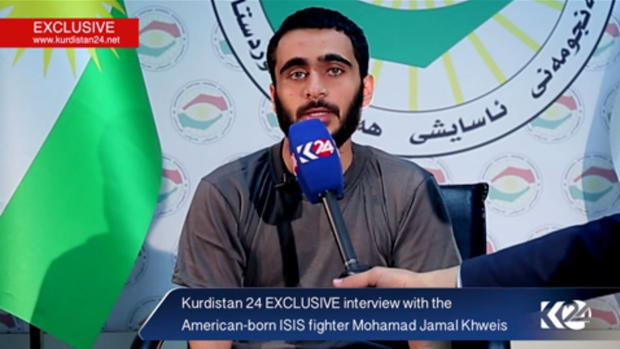American ISIS fighter who found group "very hard" back in U.S.
ALEXANDRIA, Va. -- A Virginia man who authorities say joined the Islamic State of Iraq and Syria, or ISIS, before surrendering to Kurdish authorities has been flown back to the U.S. to face terror-related charges.
A judge on Thursday unsealed charges against Mohamad Khweis, 26, of Alexandria alleging he provided material support to terrorists and agreed to be a suicide bomber.
Khweis was captured by Kurdish forces in northern Iraq in March. He told his captors he was a Palestinian-American who had gone to join ISIS. But he told Kurdish television he became disenchanted with life in ISIS and made his way to the front lines to surrender.
In an interview with Kurdistan24 shortly after his capture, Khweis said he left his hometown in mid-December and then traveled through Europe and eventually to Turkey, where he met an Iraqi girl from Mosul, which is controlled by ISIS. The pair crossed into Syria and arrived in Mosul by the middle of January.
"I made a bad decision to go... to Mosul," Khweis said. "At the time I made the decision, I was not thinking straight. On the way there I regretted, and I wanted to go back home after things didn't work out and saw myself living in such an environment."
Khweis said his parents moved to the U.S. from the Palestinian territories decades ago and that he attended mosques "not that frequent(ly)" before leaving home.
"I stayed there about a month, and I found it very, very hard to live there. I decided to return back home," Khweis said.
At the time of his capture, U.S. authorities and even Khweis' own family appeared to be caught off guard that he had left the U.S. to join the militant group.
At an initial appearance Thursday afternoon in U.S. District Court in Alexandria, Khweis - shorn of his long hair and beard - waved to his father, mother and brother as he was led out of the courtroom. He said little during the five-minute hearing; he was ordered held pending a detention hearing scheduled for Tuesday.
An FBI affidavit filed last month and unsealed Thursday states that an ISIS member asked Khweis whether he was willing to serve as a suicide bomber. Khweis said he agreed, but he told U.S. authorities that he believed the question was a test of his loyalty.
According to the affidavit, Khweis received training in Islamic law during his time there, but the affidavit makes no mention of military training. Khweis told investigators that the only time he touched a gun in his time there was to move it off a couch so he could sit down.
Khweis told the FBI he developed an interest in joining ISIS in mid-2015, and that he left in December from Baltimore-Washington International Thurgood Marshall Airport to Turkey in December 2015, according to the affidavit. He sold his car before departing.
"The defendant was inspired to join ISIL because he saw that they had established an Islamic caliphate and were in the process of expanding it," FBI agent Victoria Martinez wrote in her affidavit using an acronym for the Islamic State of Iraq and the Levant, a different name for ISIS. "The defendant stated that he knew ISIL used violence in its expansion of the caliphate, but he also stated that ISIL engaged in peaceful and humanitarian efforts."
From Turkey, he made contact with ISIS facilitators who smuggled him and others into Syria, and stayed in ISIS safe houses in the Syrian city of Raqqa during the month of January, according to the affidavit.
At one of the safe houses, ISIS officials said the recruits would be trained to return to their home countries and conduct attacks on behalf of ISIS, according to the affidavit. Khweis told investigators he never agreed to participate in such an operation.
The affidavit states that Khweis received the majority of his religious training in Mosul. The imam in those lessons ended every session by saying "May God destroy America," according to the affidavit.
According to the affidavit, Khweis admitted burning his laptop and destroying two mobile phones before surrendering to the Kurds.
Khweis' attorney, John Zwerling, said after Thursday's hearing that he was not able to comment on specifics of the case and that he had only briefly met with Khweis to discuss it. Asked if there is a legal distinction between moving to ISIS territory to live there as opposed to actively taking up arms to fight on its behalf, he said the distinction is an important one.
Merely living in ISIS territory "may get you indicted but may not get you convicted," he said. "Mosul is Mosul. A lot of people live there."
He also cautioned that the government's narrative in the FBI affidavit is its interpretation of his remarks.
"Everything is not as it appears in the government's pleading," he said.
